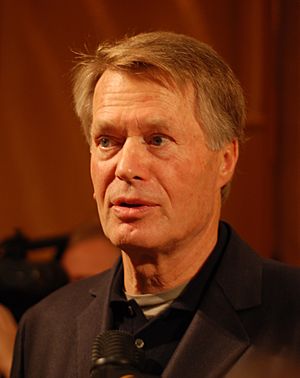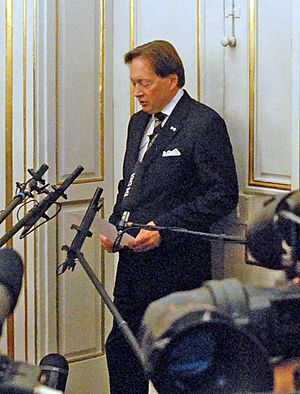J. M. G. Le Clézio facts for kids
Quick facts for kids
J. M. G. Le Clézio
|
|
|---|---|

Le Clézio in 2008
|
|
| Born | Jean-Marie Gustave Le Clézio 13 April 1940 Nice, France |
| Occupation | Writer |
| Period | 1963–present |
| Genre |
|
| Subject |
|
| Notable works |
|
| Notable awards | Nobel Prize in Literature 2008 |
Jean-Marie Gustave Le Clézio (born April 13, 1940), often called J. M. G. Le Clézio, is a famous writer and professor. He has French, Mauritian, and British backgrounds. He has written over forty books!
In 1963, he won the Prix Renaudot for his novel Le Procès-Verbal. Later, in 2008, he received the amazing 2008 Nobel Prize in Literature. He won it for being a writer who explores new ideas and shows us humanity in unique ways.
Contents
About Le Clézio's Life
His Family and Where He Grew Up
Le Clézio's mother was born in Nice, a city in France. His father was born on the island of Mauritius. Even though Mauritius was a British colony, his father's family was French. Both sides of his family came from Brittany, a region in France.
One of his ancestors, François Alexis Le Clézio, left France in 1798. He moved to Mauritius, which was a French colony then. Even when the British took over, the colonists could keep their French customs and language. Le Clézio has never lived in Mauritius for a long time. But he feels like he is both French and Mauritian. He has citizenship for both countries. He calls Mauritius his "little fatherland."
Le Clézio was born in Nice during World War II. His father was serving in the British Army in Nigeria at that time. Le Clézio grew up in a small village near Nice. In 1948, when he was eight, he, his mother, and his brother traveled by ship to join his father in Nigeria. His 1991 novel Onitsha tells some of his own childhood story.
His Education and Travels
Le Clézio studied at the University of Bristol in England. Then he finished his degree in literature in Nice, France. In 1964, he earned a master's degree from the University of Provence.
After living in London and Bristol for a few years, Le Clézio moved to the United States. There, he worked as a teacher. In 1967, he went to Thailand to help people as part of his national service. But he was soon sent to Mexico to finish his service. From 1970 to 1974, he lived with the Embera-Wounaan tribe in Panama.
Since 1975, he has been married to Jémia Jean, who is from Morocco. They have three daughters. Today, they live in different places. These include Albuquerque in the U.S., Mauritius, and Nice.
In 1983, Le Clézio wrote a special paper for his doctorate degree. It was about the history of colonial Mexico. Specifically, it was about the Purépecha people. These people live in the state of Michoacán today.
Le Clézio has taught at many universities around the world. He has visited South Korea often. In 2007, he taught French at Ewha Womans University in Seoul. In 2013, he became a professor at Nanjing University in China.
Le Clézio's Writing Journey
Le Clézio started writing when he was only seven years old. His very first book was about the sea! He became successful at age 23. This was when his first novel, Le Procès-Verbal (which means The Interrogation), won the Prix Renaudot. It was also considered for another big award, the Prix Goncourt.
Since then, he has published more than thirty-six books. These include short stories, novels, and essays. He has also translated Native American myths. And he has written several books for children.
From 1963 to 1975, Le Clézio wrote about ideas like insanity, language, and nature. His writing style was very experimental. He was seen as an innovator and a rebel. Famous thinkers like Michel Foucault and Gilles Deleuze praised him.
In the late 1970s, Le Clézio's writing style changed a lot. He stopped experimenting as much. His novels became less troubled. He started writing about themes like childhood, being a teenager, and traveling. This made his books popular with more readers. In 1980, he won the first Grand Prix Paul Morand award for his novel Désert. In 1994, a French magazine asked readers who they thought was the greatest living French writer. Thirteen percent of them chose Le Clézio!
Winning the Nobel Prize
In 2008, Le Clézio won the Nobel Prize in Literature. The Swedish Academy, which gives out the award, said his works were "poetic adventures." They also noted that his writing often focused on the environment, especially the desert. They called him an "author of new departures, poetic adventure, explorer of a humanity beyond and below the reigning civilization."
When Le Clézio gave his Nobel Prize acceptance speech, he talked about "information poverty." This means that some people don't have enough access to information. His speech was titled Dans la forêt des paradoxes ("In the forest of paradoxes").
Le Clézio was the first French-language writer to win the Nobel Prize in Literature since 1985. He was the fourteenth French writer to win it since the award started in 1901.
Awards and Special Recognitions
Awards He Has Won
| Year | Prize | Work |
| 1963 | Prix Théophraste-Renaudot | Le Procès-Verbal (The Interrogation) |
| 1972 | Prix littéraire Valery-Larbaud | For all his works |
| 1980 | Grand prix de littérature Paul-Morand, awarded by the Académie française |
|
| 1997 | Jean Giono Prize | Poisson d'or |
| 1998 | Prix Prince-de-Monaco | For all his works and for Poisson d'or |
| 2008 | Stig Dagermanpriset | For all his works and for the Swedish translation of his travel book Raga. Approche du continent invisible |
| 2008 | Nobel Prize in Literature |
Honors He Has Received
- He was made a Chevalier (Knight) of the Légion d'honneur in 1991. This is a very high honor in France. He was promoted to Officier (Officer) in 2009.
- In 1996, he was made an Officier (Officer) of the Ordre national du Mérite. This is another important French award.
- A French school in Port Vila, Vanuatu, is named after him: Lycée Français J. M. G. Le Clézio.
See also
 In Spanish: Jean-Marie Gustave Le Clézio para niños
In Spanish: Jean-Marie Gustave Le Clézio para niños
 | Aaron Henry |
 | T. R. M. Howard |
 | Jesse Jackson |


